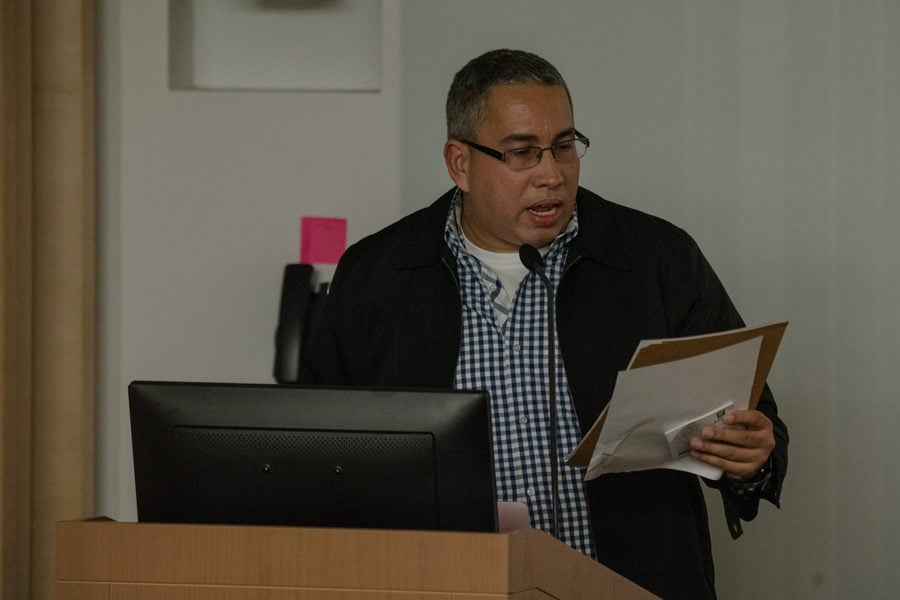Hurricane Maria survivors talk future of Puerto Rico
Brian Meng/The Daily Northwestern
Javier Valentin Feliciano speaks about his survival story to a crowd in Kresge Hall. Feliciano, a Puerto Rican, lost his sister and witnessed the devastation of Puerto Rico during the hurricane.
February 16, 2018
Hurricane Maria survivor Veronica Davila said when her house flooded during the hurricane, “the darkness (was) so deep, no one could tell how much water there was.”
Davila and Javier Valentin Feliciano, both residents of Puerto Rico, spoke in Kresge Hall on Thursday about their experience during Hurricane Maria and its aftermath. . Feliciano lost his sister, Maria Valentin Feliciano, in the hurricane and dedicated his presentation to her and policeman Angel Lorenzo-Gonzalez, who also died.
Feliciano and Davila were in separate regions of the island when the hurricane hit. The two speakers showed the audience images of leveled homes, flooded streets and long lines of refugees waiting for resources like gasoline and food from the weeks following the disaster.
“It was like this all the time,” Feliciano said several times during the presentation.
Puerto Rican officials have long criticized the lack of funding in disaster relief from the U.S. government. The island is tens of billions of dollars short of the amount of funding needed for restoration and recovery, according to a Feb. 8 New York Times article.
Frances Aparicio, director of the Latina and Latino Studies Program said that “the U.S. Puerto Rican citizenship has always been a second-class citizenship,” referring to the perceived lack of support from the federal government despite the islanders’ citizenship status.
Davila said during the event how scared her sister’s boyfriend looked when he told her that her house was flooded.
“His face told me everything,” Davila said.“I have never seen anyone so scared and so out of it in my life.”
Davila said there were cracks on the walls and bent ceilings in her house after the hurricane passed. Her father told the family to move the roof for safety, as they could not anticipate how much water would flood into the house, Davila added.
The government reported only one death in Añasco — Feliciano’s hometown — when the hurricane hit, but Feliciano said his sister was not included in the official number. Puerto Rican officials reported 64 deaths, but many believe the actual death toll was significantly higher. An analysis by The Times estimated 1,052 deaths.
The two speakers also discussed the island’s current and future political and economic situations.
Puerto Rico has been facing the threat of population loss dating back to before the hurricane, and the problem has become increasingly imminent following it. While many survivors are fleeing to U.S. mainland. Davila said she believes most of the remaining population will likely move to the service sector or travel industry because of the immigration, turning the island into a “Puerto Rican Disneyland.”
However, Davila said people cannot be blamed for fleeing the island. When families are not receiving the necessary resources for sustenance in Puerto Rico that other states like Florida promise them, Davila said it’s understandable that people will choose to leave, she said.
Feliciano said Puerto Ricans who were previously indifferent to the island’s politics finally expressed concern after the U.S. government was consistently apathetic and unhurried in their response following the disaster. However, people are still fearful of speaking out and facing repercussions, he said.
“It doesn’t seem like we’re getting out of this for long time,” Davila said.
Email: amyli2021@u.northwestern.edu



